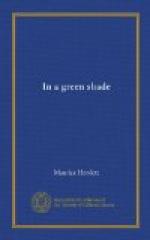CHURCH AND THE MAN
At our Peace Celebration the other day that happened which in my recollection never happened before. The entire village was in the parish church, sang Te Deum, prayed prelatical prayers, and shared Hymns Ancient and Modern. The Congregational Minister, in a black gown, read the Lesson, the Vicar, in surplice and stole, preached. All that in a village where more than half the people are Nonconformists, and done upon the mere motion of that particular section of us.
No experience since the War has touched me more; and I believe it is strongly symptomatic. Akin to it was the streaming of the people in London to Buckingham Palace, just when war was declared, and again on the day of the Armistice: both matters of pure instinct. For what do these things show except that we are children who, when we are moved, run to our mother to tell her all about it? What are we, when we are stripped to the soul, but one great family? A man told me once that he was present at a trial for murder where there were half a dozen in the dock, men and women, principals and accessories. The verdict was “Guilty,” and the wretches stood up to receive the death-sentence. As they did so, by one common instinct, they all joined hands, and so remained until they were led away to the cells. A strangely moving scene.
It is by no means a necessity of the simple alone to seek a common expression of their hope and calling. A similar stream is carrying the learned which at present runs parallel with our homelier brook, but will sooner or later mingle waters. Then there will be a flood wherein many tired swimmers will doubtless perish, but which may lead to the sea those who keep their heads. Signs of that are on all sides of us. “What is the Kingdom of Heaven?” asks Mr. Clutton-Brock, and succeeds at his best in telling us what it is not. As for anything more positive, he concludes very reasonably that it is a state of mind, and leaves us to infer that the ruck of humanity need the guidance of inspiration to induce it.
It is not at all difficult for him to show that the Church lacks inspiration, or that there is something inherent in the essence of a Church destructive of it. What should have been equally easy would have been to point out that the Church’s Founder as certainly had it. Nobody ever guided men more unfalteringly than He, and we need not doubt but that it was His instigation which turned the hearts of the village people to find a common focus for their thanksgiving. Mr. Clutton-Brock has felt the sting and owned to the need; he is in the stream, but is not a bold swimmer. I hope he may reach the sea.




